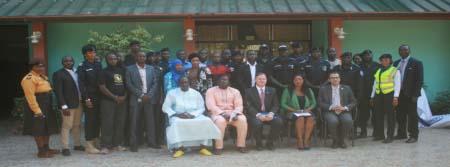
The
International Organisation for Migration (IOM) - Gambia, Wednesday wrapped-up a
three-day training for Tourism Security Unit (TSU) on Trafficking In Persons
(TIP).
The
ongoing TIP training at a local hotel in Kololi is being implemented by the IOM
with funding from the U.S. State Department’s Office to Monitor and Combat
Trafficking In Persons.
The
three-year project was designed at supporting national efforts to combat
trafficking. And it forms part of the IOM’s efforts in engaging the Gambian
tourism sector in efforts to identify and combat trafficking.
In
his opening remarks, His Excellency Richard Carlton Paschal III, the ambassador
of United States to The Gambia, thanked IOM for implementing the project and
also for their support and sponsoring a series of events in the country.
He
said The Gambia is a hospitable tourism country that welcomes people genuinely
and as well shares culture.
The
ambassador noted the importance of the organised trafficking in persons
training which he said will help trainees learn about the concepts of TIP,
identification and referral mechanisms among other aspects.
He
emphasised the important role of tourism in the country, saying; “tourism is
vital in The Gambia,” as it represents about 20% of the country’s GDP and
provides livelihood income for thousands of Gambian citizens.
Also
addressing the participants, Abdoullie Hydara, director general, Gambia Tourism
Board, disclosed that the training is in line with the Gambia Master Plan
document. He informed participants that The Gambia’s position at Tier 3 in
terms of trafficking in persons, child protection and prevention, valuable
migrant children at risk among others will be adequately discussed during the
ongoing training.
For
Gambia to successfully tackle the problem of TIP and child abuse, he suggested
that a strong collaboration and partnership with relevant stakeholders
including police, government and civil society organisations must be
prioritised. “We thought it is necessary and urgent to partner and collaborate
with IOM, U.S. Embassy and Gambia Police Force to rollout this training
programme for officers of TSU and GTBoard,” he stated.
Representing
the Department for Strategic Policy and Delivery (DSOPD) and the Office of the
President, Ismaila Danso, director of Delivery, thanked all the relevant
stakeholders for combating trafficking in persons in The Gambia.
He
expressed delight on the training, which he said could not have come at a
better time when the country has unfortunately been placed in Tier 3 from Tier
2 in the 2019 Human Trafficking Report.
He
said trafficking in persons is a crime and human rights abuse. He therefore
encouraged participants to be regular and attentive at the training as it is
designed to provide them with the knowledge and skills necessary to identify
and refer victims of human trafficking in line with national legislation and
international instruments.
Etinne
Micallef, speaking on behalf of Fumiko Nagano, – chief of mission, IOM,
disclosed that tourism brings people together, expands perspectives and
horizons and also represents a powerful force for positive change.
Among
other things, he said tourism helps to create jobs, fuel economic growth and
sustain development. Furthermore the interconnectedness that brings people
closer together, of which tourism and travel are integral parts, “is also
extremely vulnerable to the predations of organised criminal syndicates who
want to benefit from the clandestine criminal business of human trafficking.”
He
therefore thanked the U.S. government for the utmost generosity which has truly
allowed for continued support in enhancing national efforts to combat
trafficking in persons in The Gambia.
Tulai
Jawara, executive director, National Agency Against Trafficking In Person
(NAATIP), gave a detailed background and dilated on the Trafficking In Persons
Act which established National Agency Against Trafficking In Persons.

